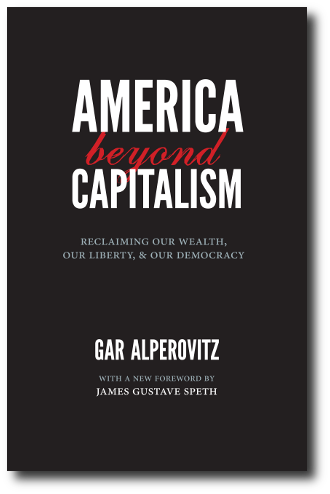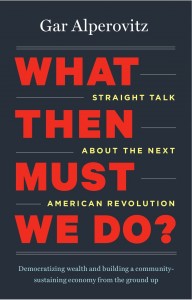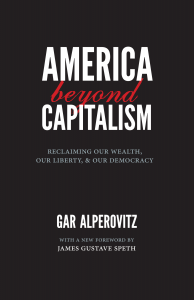It’s hard to judge the true depth of crisis developing in the foundations of our political and economic system when you are living, day in and day out, in the middle of it. But it is clear that something deep is fundamentally broken with capitalism, and that fixing it requires thinking seriously about what might emerge as what can probably only be called “a next system.”
This is not a radical judgment. Perhaps surprisingly, you can find this perspective resonating within the most powerful citadels of the system itself. Klaus Schwab, the founder of the World Economic Forum, for instance, introduced a recent Davos meeting of the global financial and political elite with these words: “Capitalism, in its current form, no longer fits the world around us […] We have failed to learn the lessons from the financial crisis of 2009 […] A global transformation is urgently needed and it must start with reinstating a global sense of social responsibility.”
Even more encouraging than Schwab’s informal comment is the consideration serious business and financial experts are giving to questions about the future of capitalism and the long term possibility of a successor system. I have found receptive audiences for my work on this subject (and my book What Then Must We Do?) at major conferences dedicated to socially responsible investing like SOCAP and SVN. I have also found that many people who have spent the last decades pioneering innovative projects that put their business acumen to use in the service of economic and social justice are beginning to realize that the system itself may be broken. And that, if so, we need to begin to think about alternatives that might be developed, even if over the long haul.
I admit that I was a bit taken aback, however, when I was asked to deliver a keynote address on August 11th at the annual Academy of Management meeting whose theme this year is, quite simply: “Capitalism in Question.” To hear this august body, with over 17,000 19,000 members at the heart of the business management profession raise such questions as the following is stunning:
The recent economic and financial crises, austerity, and unemployment, and the emergence of many economic, social, and environmental protest movements around the world have put back on the agenda some big questions about this vision: What kind of economic system would this better world be built on? Would it be a capitalist one? If so, what kind of capitalism? If not, what are the alternatives?
What’s even more interesting is the degree of sophistication with which they are doing so. Indeed, compared to the grandiose but vague calls for a post capitalist society one often hears on the Left these days, the call for submissions for the Academy of Management’s conference is a breath of fresh air. Do yourself a favor and read it over: It outlines the kind of sophisticated research agenda we’ll need if we’re serious about building something over time beyond the traditional systemic capitalist model.
At the local level we often find retired businessmen and businesswomen helping local social enterprises, B-corporations, co-ops, land trusts, municipal efforts and other potential institutional elements of a new direction. But it’s especially encouraging to see this coming from professionals at the heart of the system itself. Given the explosion of interest and hunger at the grassroots level across the country for real alternatives, we’re going to need as many people as possible who not only have a commitment to working to build a new future, but who possess the knowledge and expertise to make it viable—like those meeting at the Academy of Management Conference in Orlando this August.
 AMERICA BEYOND CAPITALISM
AMERICA BEYOND CAPITALISM



 Agenda
Agenda  Posterboard
Posterboard 